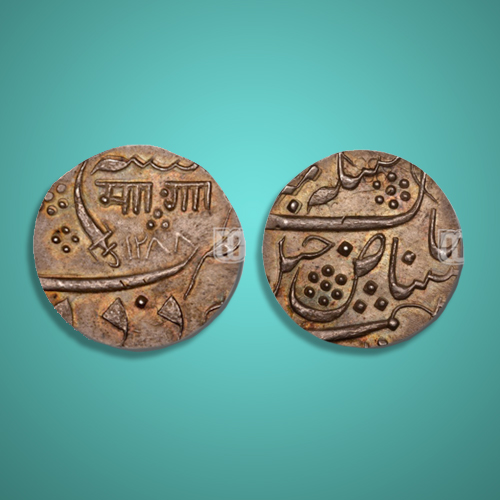Scimitar Coin of Malhar Rao Gaekwad
2021-05-03 Mon
The Princely state of Baroda was ruled from 1721 to 1949 by the Gaekwads of the Maratha Confederacy. The genesis of ‘Gaekwad’ can be traced from ‘gaikwar’, meaning cowherd. Archaeological findings have been unearthed from an area in Baroda, earlier called Ankottaka in the 5th and 6th century which was a popular center of Jainism. It was located on the banks of Vishvamitri. At the time of state re-organization after independence, Baroda became a part of the Union of India on 1st May 1949.Term ‘Baroda’ or native name ‘Vadodara’ traces roots in Sanskrit which can be understood by dividing it into Vat means Banyan tree and ‘Oodara’ means stomach. In some references, Vadodara is also defined as the ‘heart of Banyan tree’.
An adjoined coin is issued by Malhar Rao in 1289 AH. The coin was minted at Baroda and the obverse of the coin reads, “Devanagari Ma Ga, date and scimitar” and the reverse of the coin deciphers, “Persian legend, Dotted flower (rosettes)”.
Image Courtesy: Mintage World
Latest News
-
Malwa Sultan Mahmud Shah Silver Coins
2025-09-11 ThuMalwa Sultan Mahmud Shah minted silver coins in round and square flans. <br><br> For round coins,...
-
Malwa Sultan Mahmud Shah Billon coin
2025-08-26 TueMalwa Sultan Mahmud Shah's billon coins followed three weight standards: 100 rati, 96 rati, and 80 r...
-
Fascinating Archaeological Facts on Postage Stamps - 91
2025-08-23 SatRhinoceros is one of the oldest land mammal species existing in India. There are five species of rhi...
-
Fascinating Archaeological Facts on Postage Stamps - 90
2025-08-23 SatUthiramerur, a Village in Kanchipuram, Tamil Nadu, is notable for its Temple inscriptions that descr...
-
Fascinating Archaeological Facts on Postage Stamps - 89
2025-08-21 ThuThe term “millet” is derived from the Latin word “milum,” which translates to grain. millets...

